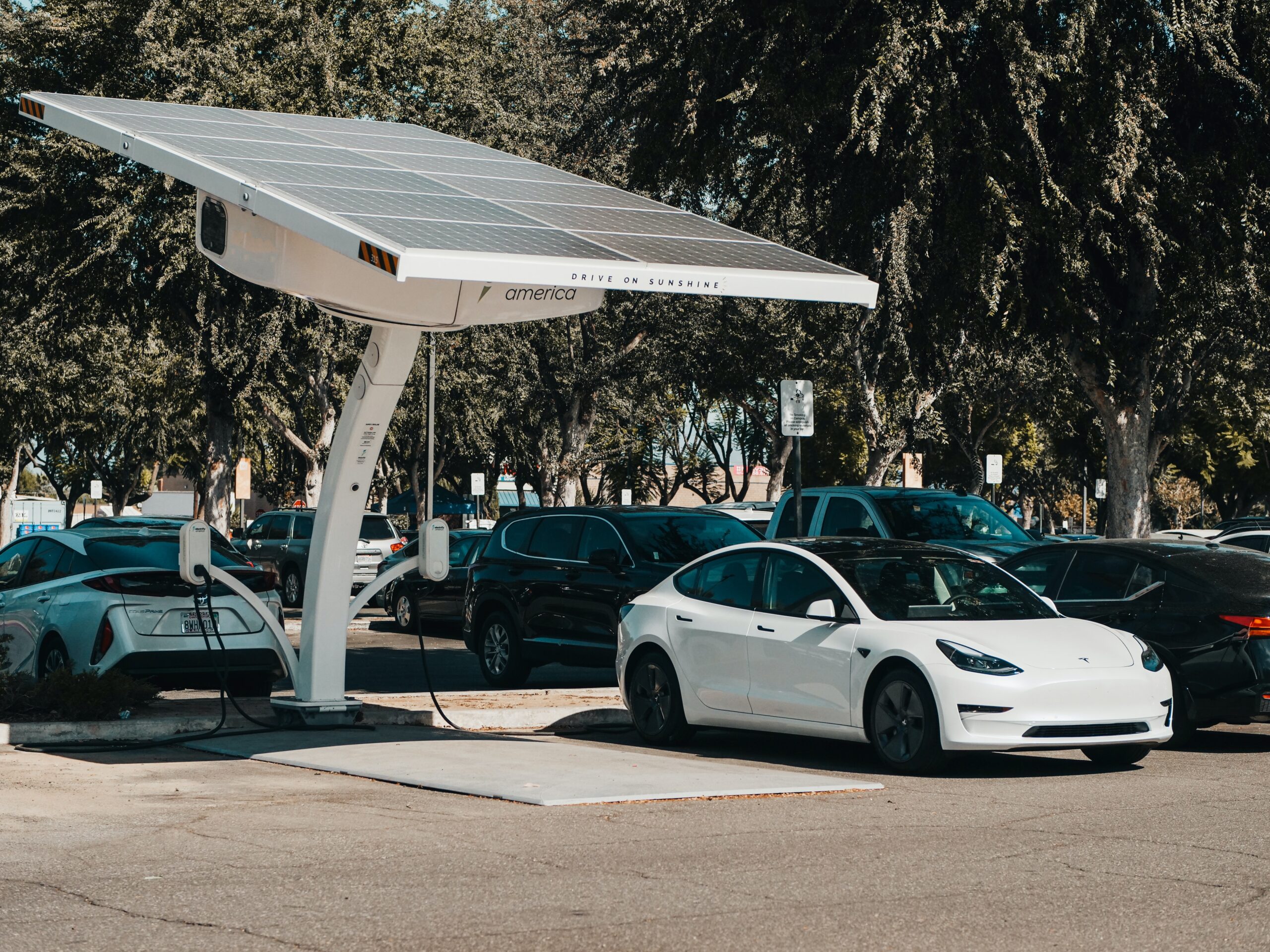With record-high gas prices, it’s no surprise that electric vehicles are getting a lot of attention. It’s getting ever so common to know someone who has an electric vehicle or is at least considering purchasing one. I was wildly torn about giving up my gas-guzzling jeep for an electric vehicle (EV), but after test driving one, I was impressed. I would be the first to admit that electric vehicles, especially 100% electric ones, are not for everyone. For many people, the EV infrastructure is not yet available, their driving habits don’t support it, or maybe losing the convenience of a gas station is too much to give up. Whatever the reason is, I genuinely believe electric vehicles are here to stay and will have a growing role in our daily lives. This is not an article to convince you to buy an EV but to highlight the various ways to invest in the ever-increasing industry if you are interested.
It’s no secret that Tesla (TSLA) commands a dominant market share of the EV industry. It’s currently estimated that Tesla makes up roughly 75% of the electric market. Tesla makes 100% electric vehicles, which may be hard for some potential buyers to commit to versus a hybrid approach. With that said, Tesla’s Model 3 and Y are some of the most popular electric cars on the market today, and you’re looking at roughly a year wait to get one if you order today. Tesla stock is currently trading in the $650-ish range, which is a massive gain considering two years ago it was trading for under $100. Tesla’s CEO, Elon Musk, has been an outstanding innovator of his time as he runs not only Tesla but also SpaceX. His company has developed stylish vehicles and challenged the car manufacturer’s status quo in many ways. But maybe investing in a 100% electric company like Tesla is too narrow of an investment, or perhaps the $650 is too high of an entry point.
Luckily, many major car manufacturers such as Ford (F), GM, and Jeep have ramped up their investment and production of electric vehicles. Ford, for example, currently has three 100% electric vehicles, including the popular Mustang Mach-E and four hybrid options. GM is similar in offering a mixture of all-electric and hybrid options. Investing in well-established car brands like Ford and GM, you can gain exposure to gas-powered and electric vehicles, which can help diversify your investment in the auto industry. Lastly, the car manufacturer is far from the only option when it comes to investment opportunities.
Microchips
Microchips have become a hot topic in the last six months as countless car makers are waiting for chip makers to finish vehicle production. Pictures have circulated the internet showing new vehicles packed in parking lots awaiting chip delivery to complete a car. Many manufacturers have been crippled by the lack of available chips and have been forced to delay car shipment to dealerships and customers. It’s not only cars that have been affected by the chip shortage as many electronics from refrigerators to washer machines have been affected. So, who are these chip makers?
Some of the more prominent names include Texas Instruments (TXN), Infineon Electronics (IFNNY), and Renesas Electronics (RNECY), to name a few. One could say these billion-dollar companies have played a hidden role in our lives as nearly all the electronics we use contain some type of semiconductor/chip. The pandemic highlighted the importance of these small components and the havoc they can create when there is a shortage. Unsurprisingly, both electric and gas vehicles use chips, so an investment in this sector could expose you to nearly the entire car industry. Furthermore, many chip companies develop products for more than the automotive industry, so an investment in microchips can expose you to other sectors.
Batteries
As the EV market grows, the demand for long-lasting, dependable batteries will become a critical component. Battery range and charging time will become essential decision points for potential customers as they consider transitioning from gas to electric. What makes an investment into a battery manufacturer unique is they have exposure to all-electric companies like Tesla and hybrid vehicles made by Ford and GM. Many battery manufacturers are out there, with new companies being established as the EV market heats up. Companies like BYD (BYDD), Panasonic (PCRFY), and LG Energy Solution (LGES) are some of the larger, well-established companies that are supplying the EV market. As the EV market continues to build, the demand for the most efficient batteries will rise drastically.
Battery Minerals
As the demand for batteries increases with the EV market, so will the minerals needed to make those batteries. The primary mineral needed for battery manufacturing is lithium to produce the lithium-ion battery. Additional minerals include nickel, cobalt, and graphite. Unsurprisingly, these minerals cannot be mined overnight and processed in short periods, which can present challenges, especially when EV sales are significantly escalating. The minerals needed to keep up with EV demand are making many car brands look closely into ensuring they have reliable supply systems of required minerals. This may mean acquiring specific mining rights across the globe, and in some cases, mining and infrastructure may need to be established. Moreover, these mining locations can vary from South America to Africa, which intertwines various governments to coordinate with. Overall, mining is big business, especially when EV-specific minerals are in high demand. When investing in mining-related companies, do your homework on locations, as mining in volatile locations can increase risk.
Recycling batteries
An up-and-coming sector of EV investment can be the recycling of EV rechargeable batteries. While the demand for recycling batteries is not there currently, this could present a more long-term investment opportunity. As more EVs get on the road, the need for an efficient means of recycling will likely be needed, and we are already seeing signs of this through some recent start-up companies. Currently, there is a lack of efficient means to take large lithium batteries and recycle them for their minerals cost-effectively. This is primarily because there hasn’t been a demand to do so until now. Additionally, EVs have only been on the road for roughly ten years, and the actual lifespan for various batteries is still being tested. If EVs become more mainstream over the coming years, the need for an efficient recycling system could prove an essential function of the EV industry. Battery recycling may be crucial for EV manufacturers to offset the time and resources needed to mine for specific minerals to produce new batteries. Be sure to keep an eye on this opportunity as the EV boom continues.
Electric Vehicle Market
The recent record-high gas prices have caused a massive demand for electric vehicles across the country. People’s motivation to purchase an EV range from their minimal carbon footprint to saving money at the pump. As mentioned before, an electric vehicle is not for everyone, but we’re clearly experiencing a demand like we haven’t seen before. Will this demand stay as high if gas prices come down? Probably not, but I do foresee EVs are here to stay. We continuously go through cycles of high and low gas prices, with current prices being some of the worse in recent decades. As the EV industry ramps up for demand, it presents both near and long-term investment opportunities to take advantage of.

